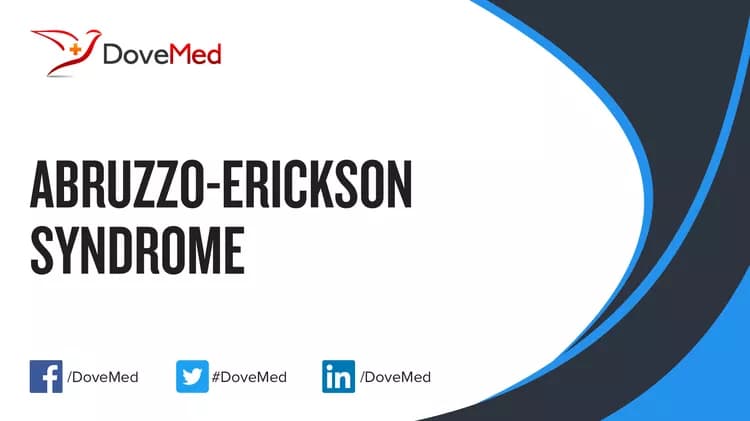What are the other Names for this Condition? (Also known as/Synonyms)
- Cleft Palate Colobomata Radial Synostosis Deafness Syndrome
- Oculo-Palato-Osseous Syndrome
- X-Linked CHARGE-like Syndrome
What is Abruzzo-Erickson Syndrome? (Definition/Background Information)
- Abruzzo-Erickson Syndrome is an extremely rare condition characterized bycleft palate, coloboma,hypospadius, deafness,short stature, andradioulnar synostosis
- Although the underlying cause of the condition is still being studied, it appears to result, at least in part, frommutationsin theTBX22gene
- The condition isinheritedin an X-linked recessive manner
- Treatment is generally aimed at addressing the symptoms present in each individual
(Source: Abruzzo-EricksonSyndrome; Genetic and Rare Diseases Information Center (GARD) of National Center for Advancing Translational Sciences (NCATS), USA.)
Who gets Abruzzo-Erickson Syndrome? (Age and Sex Distribution)
- Abruzzo-Erickson Syndrome is a rare congenital disorder. The presentation of symptoms may occur at birth
- The disorder predominantly affects males
- Worldwide, individuals of all racial and ethnic groups may be affected
What are the Risk Factors for Abruzzo-Erickson Syndrome? (Predisposing Factors)
- A positive family history may be an important risk factor since Abruzzo-Erickson Syndrome can be inherited
It is important to note that having a risk factor does not mean that one will get the condition. A risk factor increases one’s chances of getting a condition compared to an individual without the risk factors. Some risk factors are more important than others.
Also, not having a risk factor does not mean that an individual will not get the condition. It is always important to discuss the effect of risk factors with your healthcare provider.
What are the Causes of Abruzzo-Erickson Syndrome? (Etiology)
- Although the underlying cause of Abruzzo-Erickson Syndrome is still being studied, it appears to result, at least in part, from mutations in theTBX22gene
- The condition is inherited in an X-linked recessive manner
(Source: Abruzzo-Erickson syndrome; Genetic and Rare Diseases Information Center (GARD) of National Center for Advancing Translational Sciences (NCATS), USA.)
Abruzzo-Erickson Syndrome is inherited in an X-linked recessive pattern. The gene associated with this condition is located on the X chromosome, which is one of the two sex chromosomes. In males (who have only one X chromosome), one altered copy of the gene in each cell is sufficient to cause the condition. In females (who have two X chromosomes), a mutation would have to occur in both copies of the gene to cause the disorder. Because it is unlikely that females will have two altered copies of this gene, males are affected by X-linked recessive disorders much more frequently than females. A characteristic of X-linked inheritance is that fathers cannot pass X-linked traits to their sons.
What are the Signs and Symptoms of Abruzzo-Erickson Syndrome?
The signs and symptoms of Abruzzo-Erickson Syndrome vary, but may include:
Very frequently present symptoms in 80-99% of the cases:
- Cleft palate
- Coronal hypospadias
- Flat face
- Macrotia
- Malar flattening
Frequently present symptoms in 30-79% of the cases:
- Chorioretinal coloboma
- Iris coloboma
- Radioulnar synostosis
- Sensorineural hearing impairment
- Ulnar deviation of finger
Occasionally present symptoms in 5-29% of the cases:
- Abnormal localization of kidney
- Atrial septal defect
- Brachydactyly
- Conductive hearing impairment
- Cryptorchidism
- Dimple chin
- Epicanthus
- Microcornea
- Short toe
- Toe syndactyly
In addition, the following symptoms may be present:
- Wide spacing between the second and third finger
- Fingers that are angled outward toward the fifth finger (ulnar deviation)
- A slight difference in the size and shape of the right and left sides of the face (facial asymmetry)
- Dental abnormalities
(Source: Abruzzo-Erickson syndrome; Genetic and Rare Diseases Information Center (GARD) of National Center for Advancing Translational Sciences (NCATS), USA.)
How is Abruzzo-Erickson Syndrome Diagnosed?
Abruzzo-Erickson Syndrome is diagnosed on the basis of the following information:
- Complete physical examination
- Thorough medical history evaluation
- Assessment of signs and symptoms
- Laboratory tests
- Imaging studies
- Biopsy studies, if necessary
Many clinical conditions may have similar signs and symptoms. Your healthcare provider may perform additional tests to rule out other clinical conditions to arrive at a definitive diagnosis.
What are the possible Complications of Abruzzo-Erickson Syndrome?
The complications of Abruzzo-Erickson Syndrome may include:
- Vision impairment
- Permanent hearing loss
Complications may occur with or without treatment, and in some cases, due to treatment also.
How is Abruzzo-Erickson Syndrome Treated?
Presently, there is no cure for Abruzzo-Erickson Syndrome, since it is a genetic condition. The treatment is usually given to manage the signs and symptoms and any complication that develop.
How can Abruzzo-Erickson Syndrome be Prevented?
Presently, Abruzzo-Erickson Syndrome may not be preventable, since it is an inherited disorder.
- Genetic testing of the expecting parents (and related family members) and prenatal diagnosis (molecular testing of the fetus during pregnancy) may help in understanding the risks better during pregnancy
- If there is a family history of the condition, then genetic counseling will help assess risks, before planning for a child
- Active research is currently being performed to explore the possibilities for treatment and prevention of inherited and acquired genetic disorders
Regular medical screening at periodic intervals with tests and physical examinations are recommended.
What is the Prognosis of Abruzzo-Erickson Syndrome? (Outcomes/Resolutions)
- The prognosis of Abruzzo-Erickson Syndrome is dependent upon the severity of the signs and symptoms and associated complications, if any
- Individuals with mild conditions have a better prognosis than those with severe symptoms and complications
- Typically, the prognosis may be assessed on a case-by-case basis
Additional and Relevant Useful Information for Abruzzo-Erickson Syndrome:
- The name of the disorder is derived from the research scientists Abruzzo and Erickson who first described it in 1977
The following DoveMed website link is a useful resource for additional information:
Related Articles
Test Your Knowledge
Asked by users
Related Centers
Related Specialties
Related Physicians
Related Procedures
Related Resources
Join DoveHubs
and connect with fellow professionals


0 Comments
Please log in to post a comment.